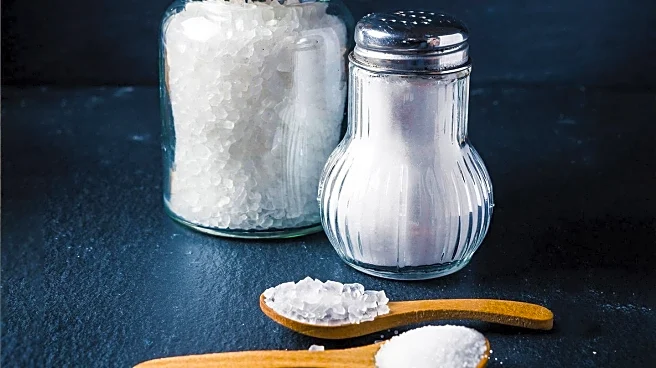What's Happening?
A recent study aimed to assess the knowledge, attitudes, and behaviors (KAB) related to salt consumption among hypertensive patients, and its correlation with 24-hour urinary sodium excretion. Conducted
in Turkey, the study involved 159 hypertensive patients who were examined and followed up at a public hospital between November 2024 and February 2025. Data was collected through face-to-face interviews using a questionnaire that included questions on general information and KAB related to salt. The study found that 49.7% of participants were aged between 56 and 64 years, with a mean age of 54.9 years, and 54.7% were female. The sodium level in the participants' 24-hour urine samples averaged 2643.7 mg/day. Despite negative attitudes towards excessive salt intake, participants were less likely to engage in behaviors to reduce salt consumption. The study highlighted that males, high school graduates, and urban residents had higher KAB scores, which were associated with a decrease in urinary sodium levels.
Why It's Important?
This study is significant as it underscores the gap between awareness and action regarding salt consumption among hypertensive patients. High sodium intake is a known risk factor for hypertension, which can lead to serious health issues such as heart disease and stroke. The findings suggest that while patients may understand the risks associated with high salt intake, they may not be effectively implementing strategies to reduce it. This highlights the need for targeted educational programs to improve KAB scores, potentially leading to better health outcomes. Such programs could help patients adopt healthier behaviors, thereby reducing their risk of complications associated with hypertension.
What's Next?
The study suggests that educational programs aimed at increasing KAB scores could be beneficial in promoting behavioral changes among hypertensive patients. These programs could focus on practical strategies for reducing salt intake, such as reading food labels and choosing low-sodium alternatives. Healthcare providers may consider integrating these educational initiatives into routine care for hypertensive patients. Additionally, further research could explore the effectiveness of these programs in different demographic groups to tailor interventions more effectively.
Beyond the Headlines
The study also raises questions about the broader implications of dietary habits and public health policies. It suggests a need for increased public awareness campaigns about the dangers of excessive salt consumption and the importance of dietary management in preventing hypertension. Moreover, it highlights the potential for policy changes, such as regulations on food labeling and sodium content in processed foods, to support healthier consumer choices.









